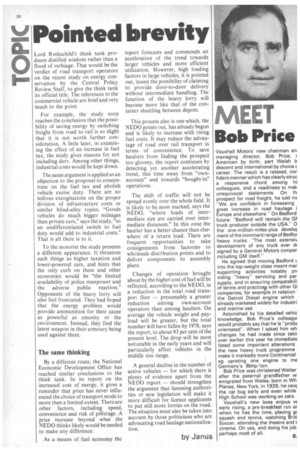Pointed brevity
Page 32

If you've noticed an error in this article please click here to report it so we can fix it.
Lord Rothschild's think tank produces distilled wisdom rather than a flood of verbiage. That would be the verdict of road transport operators on the recent study on energy conservation by the Central Policy Review Staff, to give the think tank its official title. The references to the commercial vehicle arc brief and very much to the point.
For example, the study soon reaches the conclusion that the possibility of saving energy by switching freight from road to rail is so slight that it is not worth further consideration. A little later, in examining the effect of an increase in fuel tax, the study gives reasons for not including derv. Among other things, industrial costs would be kept down.
The same argument is applied as an objection to the proposal to concentrate on the fuel tax and abolish vehicle excise duty. There are no tedious excogitations on the proper division of infrastructure costs or similar blind-alley topics. "Goods vehicles do much bigger mileages than private cars," says the study, "so an undifferentiated switch to fuel duty would add to industrial costs." That is all there is to it, To the motorist the study presents a different appearance. It threatens such things as higher taxation and lower-powered cars, and hints that the only curb on these and other economies would be "the limited availability of police manpower and the adverse public reaction." Opponents of the heavy lorry will also feel frustrated. They had hoped that the energy problem would provide ammunition for their cause as .powerful as emenity or the environment. Instead, they find the latest weapon in their armoury being used against them.
The same thinking
By a different route, the National Economic Development Office has reached similar conclusions to the think tank. In its report on the increased cost of energy, it gives a reminder that price has never influenced the choice of transport mode to more than a limited extent. There are other factors, including speed, convenience and risk of pilferage. A price increase beyond what the NEDO thinks likely would be heeded to make any difference.
As a means of fuel economy the report forecasts and commends an acceleration of the trend towards larger vehicles and more efficient utilization. However, high loading factors in large vehicles, it is pointed out, lessen the possibility of claiming to provide door-to-door delivery without intermediate handling. The function of the heavy lorry will become more like that of the container shuttling between depots.
This process also is one which, the NEDO points out, has already begun and is likely to increase with rising fuel costs. It may reduce the advantage of road over rail transport in terms of convenience. To save hauliers from finding the prospect too gloomy, the report continues by detecting yet another accelerating trend, this time away from "ownaccount" and towards "bought-in" operations.
The shift of traffic will not be spread evenly over the whole field. It is likely to be most marked, says the NEDO, "where loads of intermediate size are carried over intermediate distances." In this zone the haulier has a better chance than elsewhere of a return load. There are frequent opportunities to take consignments from factories to wholesale distribution points and to deliver components to assembly plant.
Changes of operation brought about by the higher cost of fuel will be reflected, according to the NEDO, in a reduction in the total road transport fleet — presumably a greater reduction among own-account operators than among hauliers. On average the vehicle weight and payload will be greater, but the total number will have fallen by 1978, says the report, to about 93 per cent of the present level. The drop will be most noticeable in the early years and will particularly affect vehicles in the middle size range.
A general decline in the number of active vehicles — for which there is plenty of evidence apart from the NEDO report — should strengthen the argument that licensing authorities or new legislation will make it more difficult for licence applicants to put still more lorries on the road. The situation must also be taken into account by those politicians who are advocating road haulage nationalization,
by Janus




























































































